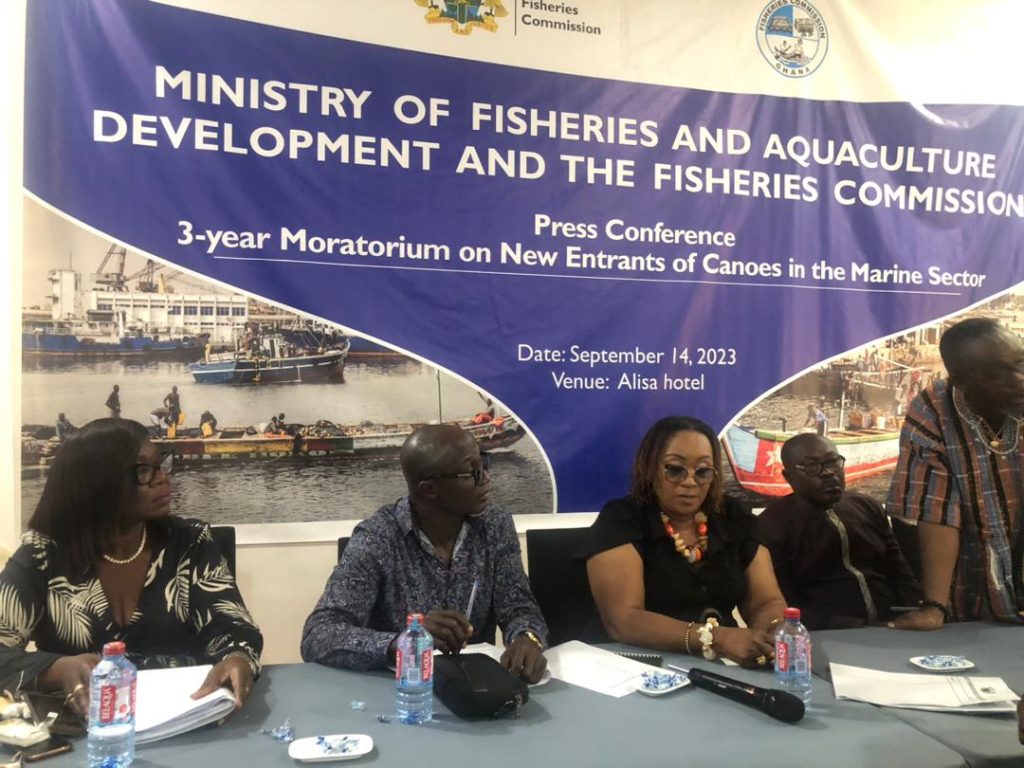By Morkporkpor Anku/ Tracy Amankwah Peprah
Accra, Sept. 14, GNA – The Ministry of Fisheries and Aquaculture Development and the Fisheries Commission have placed a three-year moratorium on new entrants to artisanal fishing.
Thus, from October 1, 2023, new canoes will not be allowed to operate at the various landing beaches along the coastal belt of Ghana until the period elapses.
The measure is to limit the number of canoes fishing along the country’s coast to make the sector more sustainable.
Traditional fisheries in Ghana involve fishers using a small amount of money and energy, small fishing vessels (canoes), and making short fishing trips close to shore for local consumption.
Mrs Mavis Hawa Koomson, the Minister for Fisheries and Aquaculture Development, announced the moratorium at a press conference in Accra on Thursday.
She said the implementation of the measure would be reviewed annually.
The Minister said the artisanal fisheries subsector, which accounts for about 70 to 80 per cent of the total annual pelagic catch, was sustained by small-scale fishers and fish processors.
Notwithstanding the significance of the subsector, she stated that “our artisanal fishermen have engaged in activities that have contributed to overcapacity, overfishing, low productivity, and low profitability in the marine fisheries sector.”
Mrs. Koomson noted that the current open access regime had increased the canoe fleet from 8,000 in 1990 to over 12,000 in 2023.
She said that whilst fishers sought to make their expeditions more profitable, small pelagic species were on the verge of extinction.
Small pelagic fish landings, which are the backbone of the artisanal subsector, have decreased from 119,000 metric tons in 1990 to 20,000 metric tons by 2022.
Mrs Koomson disclosed that the annual landings of the Sardinella Aurita declined from 119,515 tonnes in 1992 to 11,834 tonnes in 2019, representing 9.9 per cent of its largest recorded landings.
“Indeed, our scientists have informed us that a stock is considered collapsed when it reaches 10 per cent of its highest yields and have therefore concluded that the Sardinella Aurita has collapsed,” she added.
The Minister said the decline in landings of the small pelagic fishes was affecting the livelihoods of over three million people along the value chain.
She said this situation had compelled most fishers to engage in various forms of Illegal, unreported, and unregulated fishing activities, such as the use of undersized mesh nets leading to landing of juveniles, light fishing, the use of chemicals and explosives to make their fishing expedition profitable.
This resulted in the adoption of measures to address these challenges, such as a closed season for all of the fleet, a ban on Saiko, the introduction of a new trawl gear directive, a reduction in trawler fishing days, an improved licensing regime for semi-industrial vessels, the piloting of electronic monitoring systems on trawlers, and the establishment of co-management structures such as small pelagic co-management committees.
The Minister said the Ministry and the Commission had engaged extensively with all stakeholders at the community, district, regional, and national levels over the past two years to support the moratorium.
She said the management measure had been included in the National Fisheries Management Plan (2022-2026) to align fishing efforts with estimated annual sustainable levels.

It would end the open access regime, implement fully the Canoe Identification Cards, and re-characterize canoes by size, gear, and motor.
The measure is also to improve the socio-economic well-being of fishers along the value chain, improve efficiency in the sale and distribution of premix fuel and contribute to the reduction of deforestation to mitigate the impact of climate change.
Mr Jojo Solomon, Chief Fisherman with the Ghana National Canoe Fisherman Council, commended the Ministry and its agencies for implementing the measures to improve the sector.
“We support all of the initiatives that the ministry has introduced to address the challenges associated with the sector,” he added.
GNA